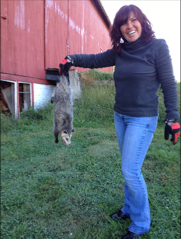Animal Control & Dog Licenses

Animal Control Officer Jamie Fazzalore-Truelove
Lost Pets, Wildlife and our Animal Control Officer
To report a lost pet or animal control problem that requires immediate assistance, call police dispatch: (215) 493-4011.
As part of its public safety commitment to its residents, Lower Makefield Township retains the services of an Animal Control Officer (ACO). The ACO’s duties are coordinated through, and in conjunction with, the Police Department.
Our ACO, Jamie Fazzalore-Truelove, has been performing those duties for Lower Makefield Township for 8 years. She has extensive training in the Animal Control field. Animal Control training includes animal control and capture, self-protection, dart gun training, and bite stick training among others. She is trained and certified by the National Animal Control Association.
To contact LMT ACO Jamie Fazzalore-Truelove, email her at ACO@lmt.org or call Police Headquarters at 215-493-4055.
ACO Duties
The Animal Control Officer Duties include enforcing the Lower Makefield Township Ordinances related to dogs as well as the Pennsylvania Dog Laws.
- Dogs Running-at-large
- Leash Law
- Dog Nuisance
- Dangerous Dogs/Dog Bites
- Lost Pets (Dogs/Cats)
- Verifying PA Dog Licensing/Rabies Vaccinations (3 months or older)
Dog licenses may be purchased from the County Treasurer. www.padoglicense.com
Outside the Scope of ACO Duties
The LMT ACO does not handle (by statute nor ordinance):
Wildlife issues (including skunks, raccoons, squirrels, groundhogs, possums, deer, fox, coyote etc), whether on your property or in your home. A Wildlife Removal Specialist should be contacted if you have those issues.
The exception to this would be if the wildlife became a public safety issue as in; injured, distressed, or a visibly rabid animal, then the ACO and/or the police may be involved.
Tips on Your Lost Pet
- Call the police dispatch number (215-493-4011) once you realize you pet has escaped.
- If you live along a township border, also alert that neighboring police department.
- Call the BucksCountySPCA (215-794-7425), your pet may have been taken there.
- Chipping AND registering your pet greatly increases the chance of a successful return.
Living with Wildlife in Lower Makefield Township
by Jamie Fazzalore-Truelove
If you live in Lower Makefield Township, you live with wildlife – the furry creatures that live among us: under our decks, around our sheds and bushes, as well as those that run in front of our cars while driving through the township.
Even though some may want to rid LMT of all of the creatures among us, that is not a feasible solution, nor something we want. We need these animals, and need to learn how to co-exist with them. They help propagate plant life, rid our lawns and neighborhoods of unwanted and damaging insects and pests. In short, they help to insure the balance of nature and biodiversity in our midst.
In my time as ACO I have heard all kinds of stories and complaints: “my dog smells like a skunk,” “squirrels are tearing apart my birdfeeders,” “there is some kind of Yardley Yeti-looking thing on my deck.” Truth be told, if we take necessary measures, we can limit our contact with wildlife. Part of my job is to educate the public in coexisting with our furry friends, as opposed to getting rid of them.
Here are some quick tips for the most common encounters:
Bunnies
Leave them be. Mom only feeds twice a day and you won’t see her. If the eyes are open and the ears are up, they are big enough to be on their own. Keep kids and pets away.
Fawns
Leave them be. Mom only feeds twice a day and you won’t see her. Fawns will not move for the first 2 days. Only call non-emergency number if fawn is bleeping. Keep kids and pets away.
Skunks, Raccoons, Possums
Never touch or approach. If injured, call non-emergency number.
Squirrels
If fallen out of nest, call non-emergency number. Or put gloves on, wrap in towel, put in box and take to AARK or Mercer County Wildlife Center.
Baby Birds
Put back in nest if possible. Most fledglings stay on ground for one to two days while learning to fly, mom should still be feeding them.